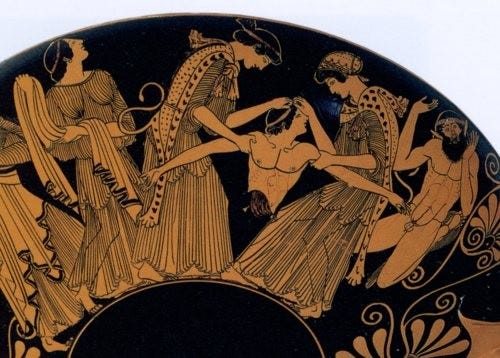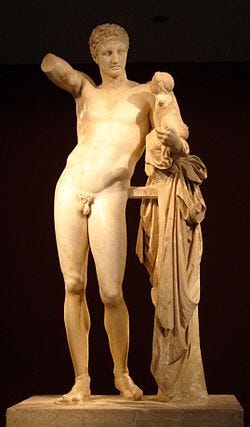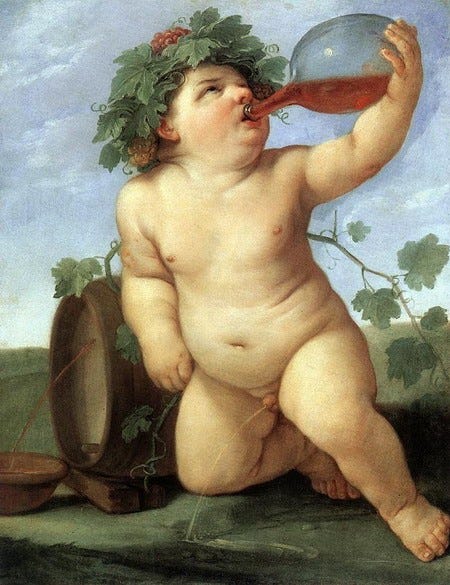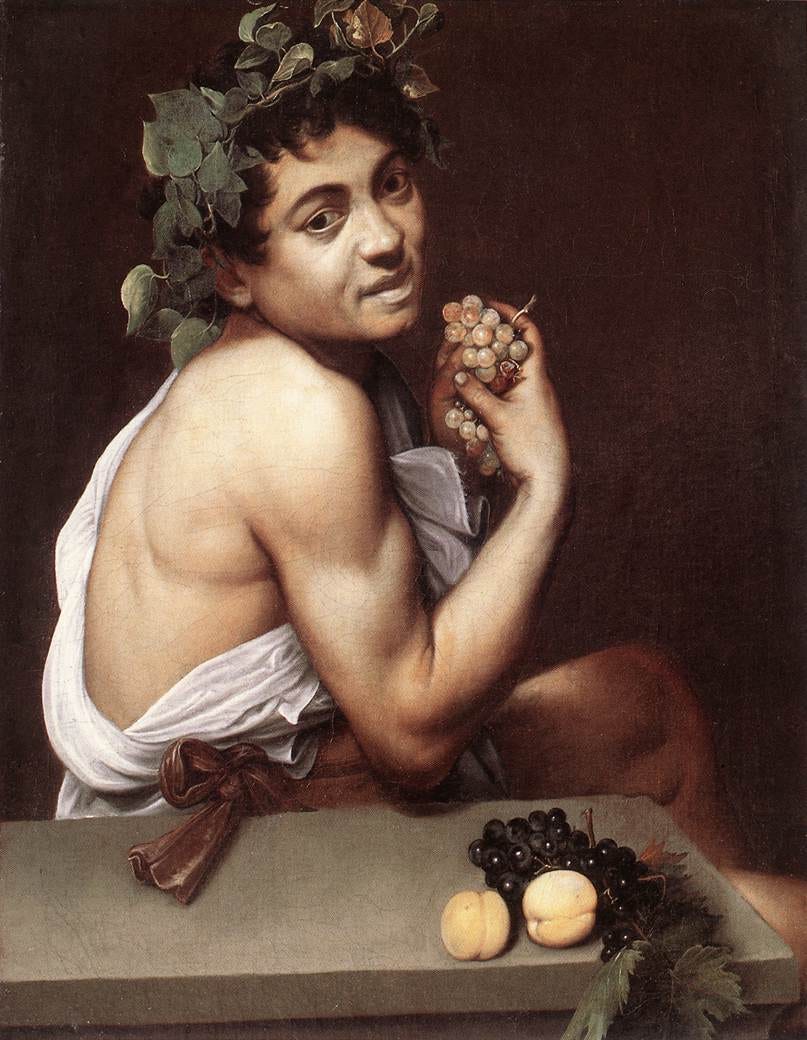Dear Classical Wisdom Reader,
So, I’ve recently been reading Donna Tartt’s novel The Secret History.
It’s the dark tale of a class of Classics students who find themselves crossing the boundaries of conventional morality…
Now I’m not quite finished it just yet (so no spoilers!), but it’s surprising how much the figure of the Greek god Dionysus looms large over the proceedings. Especially considering it’s set in the 1980s!
Of course, Dionysus is nothing if not a boundary pusher.
To the Greeks, Dionysus (also known as Bacchus) was a subversive figure of transgression. The Festival Dionysia, when Greek tragedies were staged, was held in his honor.
He is the central figure of Euripides’ masterpiece of tragedy, The Bacchae, and he’s attracted the attention of many artists and writers over the centuries.
And as Greek gods go, his mythology is particularly colourful.
So read on below to discover the compelling body myths that surround this most mysterious of deities… including how he was “twice born”!
All the best,
Sean Kelly
Managing Editor
Classical Wisdom
Dionysus: God of Ecstasy and Wine
By Ben Potter
As a figure of myth and superstition even in his own time, Dionysus could well have been dismissed by the cynical as being an unworthy interpolation into the field of true religion.
However, although “he represents an enchanted world and an extraordinary experience” (Albert Henrichs), the scope of his temporal power is hard to overstate.
The twice-born Dionysus is technically, like Heracles, a demigod, though unlike the twelve-time labourer, his godliness is dominant over his humanity.
Dionysus’ bizarre incubation started when Zeus impregnated Semele, the daughter of the Cadmus, king of Thebes.
Subsequently, Zeus’ (understandably) jealous wife, Hera, concocted a plan for revenge. She convinced Semele to request that she see Zeus in all his divine glory, knowing that the sight of the god would overload Semele’s frail, human form, causing instant incineration.
From these ashes, Zeus recovered Dionysus, sewing the charred and blackened foetus up in his thigh.
Thus the King of the Gods gave birth to Dionysus (a bizarre, but not unique feat – Athena was also born from Zeus’ fractured skull). The babe was then given to his human aunt, Ino, for safekeeping.
However, Hera, her spleen not yet fully vented, sent Ino and her family into a frenzy of madness and suicide. Thus, Dionysus was passed along to the nymphs of Mount Nysa (from where he gets his name) and there his induction into all things sublime, sensational, sexual, salacious and sinister started.
He self-proselytised across Greece, Asia and India, bringing madness and death upon those who denied him. The chief example of this was the poker-faced wrath he brought upon his cousin, Pentheus, King of Thebes, made famous to us through Euripides’ play The Bacchae.
Though not all tales on Dionysus are dark or depraved.
A particularly charming story about him comes from the seventh Homeric hymn which recounts his capture by pirates. The unsuspecting brigands got more than they bargained for when the god’s bonds dropped off and he turned into a lion, all while a great vine grew around the ship’s mast.
Quite understandably, the pirates all jumped overboard, only to be turned into dolphins upon hitting the water.
For this and other tales, Dionysus is:
“perceived as both man and animal, male and effeminate, young and old, he is the most versatile and elusive of all Greek gods”. (Albert Henrichs).
Of course it is the vine motif that flashes first into our minds when we think about Dionysus.
Indeed, this aspect of his personality is represented in some of the most famous artwork of which he is the subject. For example, the seminal ‘Hermes and the infant Dionysus’ shows the older god dangling grapes over the head of the younger.
Likewise, this facet of the god was a regular feature in literature.
Among the earliest poets, it can be seen that the wine-giver holds a particular place of affection in the hearts of the poetical:
“Cut off all the grape clusters…show them to the sun for ten days…cover them for five, and on the sixth day draw off into vessels the gifts of joyful Dionysus.” (Hesiod, Works and Days).
Elsewhere, Hesiod refers to the god as ‘he of many delights’ and Homer, in the Iliad, calls him the ‘comforter of mankind’.
The following twist on that theme, from Euripides’ The Bacchae, will be of particular interest to those of us for whom Sunday is more than merely a day to watch football and mow the lawn:
“When mortals drink their fill of wine, the sufferings of our unhappy race are banished, each day’s troubles are forgotten in sleep. There is no other cure for sorrow. Dionysus, himself a god, is thus poured out in offering to the gods, so that through him come blessings on mankind”.
Though unlike Jesus of Nazareth, Dionysus may well have been, quite astonishingly, a teetotaler.
Although there are some Renaissance depictions of him imbibing his own gift, in antiquity this is not the case.
That said, he is almost invariably depicted close to wine, grapes, or drunkards; his entourage of satyrs are forever indulging in inebriated dancing, fornicating and revelling in general.
And if the satyrs represent all the naughty fun and frolics that go hand in hand with overindulgence, it is the maenads (or bacchae), female followers of the god, who lend things a dark and sinister air.
Maenads, on their annual pilgrimage to the mountains, would pay homage to the god by inducing in each other a ritualised frenzy, often described (by others) as a madness. Though commentators have often used drink or drugs to explain this away, contemporary accounts put it down to an infusion of the god into the body; perhaps a form of intense, liberating meditation.
Both in art and literature this mania culminates in the bare-handed rending of a live animal (sparagmos) and the raw consumption of its flesh (omophagia).
The once-popular idea that this carcass was a ritualized ingestion of the god himself is no longer in vogue (though remains to be convincingly refuted). The fact that Euripides interpolates King Pentheus into the role of sacrificial animal implies that cannibalism, though ghastly, does not seem to be wholly inappropriate.
Ignoring the god/man-eating aspect, the fact that the sacrificial meat was uncooked is a perverse act in and of itself and an example of how Dionysus revels in his role as disrupter of the social order.
This too is reflected in his public festivals, of which there were at least seven annually in Athens alone. Characteristics of these celebrations were excessive and open drunkenness, obscenity, lubriciousness and transvestitism; all amidst huge, decorative phalli that lend a je ne sais quoi to any event.
Along with wine, intoxication and ritual madness, Dionysus was also a god of theater – comedy and tragedy reflecting perfectly the dichotomy within his soul – as well as masks, impersonation and, almost paradoxically, the afterlife.
Indeed, this aspect should not be belittled as he constantly crops up in funeral art. The pre-Socratic philosopher, Heraclitus, went as far as to say: “Dionysus, in whose honour they rave in bacchic frenzy, and Hades are the same”.
So how are we supposed to view this internally incongruous, but undoubtedly important god?
Well, Dionysus is certainly a joke, but a joke borne of lust and power, of wine and spite, of ecstasy and shame.
His beauty and brutality are so pervasive that at times he is almost the embodiment of a last request; one final moment of frenzied delight before the trapdoor opens and the noose tightens.
He is death, blood, beauty, pain, art, ecstasy, elation, and envy; a man for whom one would gladly hold a feast day, perhaps without acknowledging the dreadful truth of what could potentially be on the menu.
Euripides certainly portrays him as a creature of horror and violence; one desirous of carrying out torture and humiliation.
Perhaps as one so cruel and beautiful, powerful and appetitive, he is not merely versatile, but strikes to the heart of our own divine empathy.
After all, there is barely a man who ever existed who doesn’t have something in common with Dionysus. And it may be this, more than anything else, that fascinates and repels in almost equal measure.










He was the god in the Midas Touch, who gave and later revoked the golden touch. If you look at his speeches, he advocates freedom and individuality above all else, it is up to you to learn to master yourself.
I love Caravaggio’s "Bacchus". He doesn’t just depict the god as the lively and chaotic figure we might expect. Instead, he shows us a youthful, somewhat androgynous Dionysus, almost sickly, with flushed cheeks. It reflects the ambiguity of indulgence—the fine line between pleasure and decay. Great article!